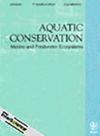Analysing Turbulence Patterns in Nature-Like Fishways: An Experimental Approach
Abstract
Nature-like fishways are an important measure for restoring fish passage, mitigating the impacts of barriers, and providing valuable habitat benefits in a more natural and effective way than traditional technical fishways. Their ecological advantages make them a preferred solution in many river restoration projects. The turbulence at the fishway's pool is a key challenge in the design of fishways. This study evaluated the hydraulic performance of the nature-like fishway section of the Zongyang Fishway Project in China. This utilized a trapezoidal cross-section with a 1:242 bottom slope, 1:2 side slopes, and an operating water depth of 1–3 m. The bottom and sides were paved with 0.2–0.5 m diameter pebbles to create suitable habitat for bottom-dwelling fish. The target design velocity was 0.7–0.9 m s−1. A physical model was constructed to assess the hydraulic characteristics of the nature-like fishway, including flow velocities within the slots and turbulence levels in the pools. The results showed that the slot velocities were within the target range, the head loss was parallel to the bottom elevation, and the flow field near the bottom mimicked technical fishway conditions, whereas the surface flow resembled open channel flow. Turbulence intensity remained below 60% of the design velocity. These findings provide valuable insights into the hydraulic performance and suitability of this nature-like fishway design for facilitating fish passage of the target freshwater species along with directly aiding to SDGs 6 and 14.

 求助内容:
求助内容: 应助结果提醒方式:
应助结果提醒方式:


